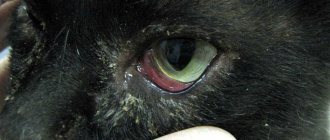The eternal question of cats' loyalty
Cat loyalty: myth or reality?
Such special cat devotion
Dogs are considered more loyal to their owners, but many cats are in no way inferior in devotion to humans, and are very afraid of losing him. Therefore, when a stranger comes to visit, or a child or other animal appears in the family, the cat may behave in a completely unfamiliar way.
A pet can easily rush at a guest, hiss at him, scratch him, and leave a bad mark in a variety of places. The thing is that cats are jealous, and when new faces appear in the environment of its owner, they are afraid that the owner will forget about them.
Cats are owners
From my own example, I can confidently say that cats are owners. When my “cat” family received an addition in the form of a little kitten Dolechka, the old-time cats, seeing how I stroked her and played with her, immediately began to deliberately climb onto the table, throw off keys, tubes of creams, chew wallpaper and create everything for which I scold them. As soon as Dolechka left my arms, the “mayhem” stopped, and they immediately lay down next to me and calmly dozed.
Drastic changes in life
Just like us, cats have their own habits. Every day they eat, sleep, play at about the same time and they like it. Breaking this routine can be scary for them. They begin to fear that something bad will happen to them.
For example, if you change your lunch time to a different part of the day, they may start to worry that they won't be fed. However, it is usually only major life changes that make them fearful. This could be a new family member, a child, moving to a new home, or even starting a renovation.
Loud noises are scary for cats
Loud and harsh noises are another phobia for many cats.
And it’s all about the incredible sensitivity of their hearing, as well as the fear of objects that make unfamiliar and unpleasant sounds. As soon as I take out the vacuum cleaner, the cat immediately hides under the sofa or climbs onto the closet. Another cat, on the contrary, does not experience much discomfort at the sight of a vacuum cleaner, and even an electric drill will not force it to leave its heated place.
It turns out that the same sound and object are perceived completely differently by cats. If your animal is afraid of fireworks, thunder, hair dryers and other noisy phenomena and objects, you should not pull her out of hiding. If your pet prefers to sit under the sofa during a thunderstorm, let her sit, it will be much calmer, and it is possible that the fear will go away on its own.
Rating of cat repellent sprays
| Spray name | Distinctive feature | Price |
| Spray 8 in 1 “Nature's Miracle” | Eliminating odors of marks and urine in the toilet, deterring further mischief | 550 rub. Check the price in the store |
| Doctor Vic | Low price and content of natural essential oils in the composition | 215 RUR Check the price in the store |
| Beaphar “Stop – it Cat” | Contains methyl nonyl ketone. Effective against marks from adult cats. | 750 rub. Check the price in the store |
| Biovax “Shit? No!" | Effective kitten repellent | 125 rub. Check the price in the store |
| Faithful friend “4 in 1” | Multifunctional product with a pleasant aroma for humans | 150 rub. Check the price in the store |
Spray 8 in 1 “Nature's Miracle”
The spray contains essential oils of lemon and thyme - repellent components. Designed for cleaning surfaces damaged by pets. Wet the area to be treated generously and leave for 10 minutes, then remove the moisture with a napkin. Good for removing stains. Effective for scaring away and weaning cats from shitting. But the spray must be used in the absence of children and people with hypersensitivity to odors.
Doctor Vic
Repellent based on essential oil of rue tree to correct the behavior of a pet. Apply to the surface of furniture, floors, flower pots at a distance of approximately 30 cm. Treatment is carried out once a day until the cat stops approaching the treated area. Effective in repelling cats, but may cause an allergic reaction in humans.
Important! Do not spray directly onto houseplants, flowers or soil.
Beaphar “Stop – it Cat”
The main active ingredient is methylnonyl ketone. Apply to objects, furniture and floors once a day until the cat’s bad habit is completely eliminated. Preferably used for adult cats. Effective in combination with an attractive spray.
Biovax “Scare away? Yes!"
Contains essential oils of tea tree and cinnamon. Designed to protect furniture, wallpaper, floors. The surface is treated once a day at a distance of 20 cm. It is effective only for scaring away kittens. Adult animals do not react at all.
Important! Do not apply to animals or plants! May cause allergic reactions in humans.
Faithful friend 4 in 1
The spray contains essential oils of lavender and tea tree, which is the main deterrent component of the product. It is designed to protect furniture, walls, and floors from being scratched and marked by a pet. Spray over the surface at a distance of 25 cm. Apply 1-2 times a day. It has a pleasant aroma that does not irritate human mucous membranes. Has no visible effect of repelling unneutered cats.
Are all cats afraid of water?
As soon as the water starts flowing in the bathroom, and I inform my pets that bath day has come, prepare towels and brooms, then by their behavior the cats communicate that they are not delighted with my idea. As a result, water procedures often end in stress for cats, and for me, bandaged hands.
It is believed that cats are afraid of water because their fur gets wet and deprives it of its warming function. But the fact is that there are hairless breeds living in my house, and they are terribly afraid of water. It turns out that the process of washing and water itself causes the main fear, and not the likelihood that the cat will freeze. In any case, I suggest you read the article why cats are afraid of water if you are interested in this issue and want to clarify it for yourself.
The main reasons for cats’ fear of people and methods for correcting behavior
Do you scream, spank, swing or stomp on your pet? This is rude, aggressive and threatening behavior, if after such gestures the cat begins to be afraid and attack you - do not be surprised, you deserve it! If you want to correct the situation, start with yourself; it is not your pet’s fault that he is forced to defend himself and fear for his life.
Usually, in this case, cats are afraid of certain people, for example, veterinarians after undergoing surgery. Also included in this category are animals that have experienced rough treatment or bullying by their former owners. Animals that have experienced the horrors of existence in municipal shelters are usually also afraid of people who resemble former caretakers.
Of course, shelters and curators are different and sometimes four-legged animals are lucky to find themselves in a friendly atmosphere. However, if you decide to purchase a pet from a shelter, you should prepare in advance for possible difficulties. There are no special methods for correcting such fear, only affection, patience and no pressure on the psyche. Over time, the fluffy one will believe in your good intentions.
Cats are quite territorial, and it is important for them to have their own, safe place. If your furry friend physically cannot hide from guests or children, at first he will be under prolonged stress, then you will observe passive-cowardly behavior and only then will you feel anger on yourself.
By the way, a pet may worry about the inviolability of its territory and is not afraid of people, but it may take out its anger on bipeds. For example, seeing a cat outside the window, your ward will get angry at him, but will scratch you or your child. There is only one reason - the cat does not feel safe. Correct this and the behavior will return to normal.
If a cat is afraid of strangers, loud sounds, or other animals, this is due either to a lack of personal space or to a complex of self-doubt. To correct the behavior, you will need to do two types of work - equip a closed hole for the animal. In a small apartment, you can allocate space on the closet for your cat by first equipping a rigid ladder. When meeting guests, the four-legged dog must also be on top (in the literal sense of the word). Lots of options:
- Provide the ward with access to the highest points of the premises - cabinets, kitchen units, etc.
- Feed the cat at a high height from the floor. Moreover, if, towering above everyone else, the pet eats food in the presence of guests, this can be considered serious progress.
- Equipping safety palms is an installation with a wide and heavy “pancake” at the base, then a thick pole (like a scratching post, only tall) and at the top a platform that the cat can climb onto if it gets scared. Climbing a tree when threatened is the instinctive desire of the mustachioed striped species.
We suggest you read: How to become a good host
Cat and smells
Many cats simply jump away from the smell of lemon, nail polish, scented hygiene products, vinegar, etc. Strong smells irritate the cat's nasal passages, and the cat tries to avoid strong scents for fear of losing the ability to smell. It’s hard to call it a phobia - rather a natural reaction to something that is unpleasant.
For example, citrus fruits are a strong allergen for cats and have an extremely unpleasant odor for them. Is it any wonder that the cats will avoid him?
Repellent odors in the fight against bad habits of cats
Knowing this feature, the owners will be able to protect some places in the apartment or house from visiting the pet. Often, a naughty cat may use a flower pot or corners of rooms as a toilet, leave fur on the bed, and the sofa is usually perfect for sharpening its claws. Read the article about special nail caps for cats.
To wean cats from bad habits, it is necessary to install “aromatic barriers”.
It is important to remember that a cat repellent can be unpleasant not only for the animal, but also for the owner, so prevention must be done with caution. So, what smell are cats afraid of, and how can this information help in deterring them from certain areas?
Repellent odors:
- Rue oil is extracted from the plant itself. You can use branches, placing them in places where you don’t want to see your pet. Human contact with the plant can cause allergies.
- Raw grated onions remain unpleasant for cats for a long time, invisible and safe for humans.
- Vinegar is a very effective substance; its smell irritates the pet’s nose for a long time.
- A mixture of lemon oil, rosemary and water is a repellent spray for cats. You need to take 10 drops of lemon oil, 20 drops of rosemary oil and a liter of water. Stir the ingredients and periodically spray the surfaces with the solution. Essential oils have a beneficial effect on humans, but they cause disgust in cats.
- You can make antigasin for cats with your own hands from water, lemon juice or grapefruit. The leaves of flowers are wiped with the product so that the cat stops gnawing them. You can cover the ground around the plant with orange or tangerine skins if it starts to constantly crap into it. Such sour and pungent odors are very unpleasant for a pet, which is why cats do not like citrus fruits, but such aromas, on the contrary, are pleasant to humans.
- Crushed citrus peels can be mixed with coffee grounds to create a cat repellent with a smell they hate. Homemade remedies are cheap, but they are very effective.
- Special soil additives containing particles of predator urine are sold in pet stores or gardening stores. The product is great for use in open ground, it can also be added to a pot with a plant, the price of antigasin for cats will be higher than for homemade products, but such additives are more effective. They are a radical way to repel cats.
- Black pepper. You need to take a cup of water, bring it to a boil, simmer for 5 minutes, and then add 2 teaspoons of freshly ground black pepper and stir thoroughly. Pour the cat repeller spray into a spray bottle and spray in the places from which you want to scare her away.
- Cats absolutely cannot stand the smell of alcohol. Cigarette smoke is also unpleasant for them, but if the owners smoke, they gradually get used to tobacco.
Owners often wonder what smells repel cats - so as not to shit or mark the territory in the apartment, the answer is simple: the smell of citrus fruits, rosemary, lavender. It is wise to add citrus essential oils, cinnamon or lavender to the water for washing floors, but the main thing is not to overdo it with the proportions.
Meeting with a veterinarian
Just as children are afraid of doctors, cats are afraid of veterinarians.
Fear of the veterinarian is an individual phobia. I have had to take my pets to the vet, and each of them reacted differently to the doctor. Some growled and covered their ears, some remained indifferent, and some even purred.
Once, I had to give vitamin injections to cats myself, which is a rather unpleasant procedure. The injection had to be made in the muscle of the back leg. At the sight of a syringe, the pets ran away like cockroaches, but after the course of treatment they completely calmly allowed us to stroke and touch any part of their body. But here is one cat, which has a calm and affectionate character, and still, if you even lightly touch his back leg, he becomes crazy, aggressive, rushes and hisses.
Dogs
The phrase “like cats and dogs” exists for a reason. Many cats and dogs get along well, but this rarely happens immediately after they are rehomed. Rather, those cats and dogs that communicate from the first months of life can become best friends.
If a cat sees a dog it doesn't know or misinterprets the intentions of a playful dog, it can cause fear. Even cats and dogs that usually get along with each other can get scared. Positive reinforcement and a safe environment are the best ways to help them avoid panic.
How to rid a cat of fears
How how? You need to love your Mustache, first of all! You are unlikely to be able to eliminate many cat fears, but you can let your pet know that what he is afraid of is completely safe. For example, if a person unfamiliar to the cat comes to your house, give the guest the animal’s favorite treat so that when he enters the doorway, he treats the cat to it. There is no need to rid your cat of its fears by intimidation. For example, many owners, in order to rid the animal of its fear of the vacuum cleaner, begin to deliberately bring frightening household appliances to the animal.
If your cat’s fears somehow bother you, then you can take the animal to a cat psychologist, or better yet, invite it into your home so that the specialist can see the full picture of the animal’s fears and give valuable advice.
How to bathe
There is no urgent need to wash a cat, since it is a clean animal in itself, which independently maintains the cleanliness of its fur. But in some cases such a need arises, for example, after a street walk in rainy weather or the appearance of an unpleasant odor.
A cat’s attitude towards bathing is often based on the first “acquaintance”: if the encounter with the water element was not the most pleasant, which may be the fault of the owner, then fear of water procedures is guaranteed. Very often, the owner does not provide the opportunity to “make friends” with water and simply holds the pet in the bathroom by force, and sometimes yells at it. If you do not want to repeat such mistakes, you should know how to wash a cat that is afraid of water. With enough patience and care, you can teach him to wash. Training should begin at an early age so that in the future the cat will not be afraid to wash himself in the bathroom. If you need to buy an adult animal, it is important to make this procedure as pleasant and comfortable as possible.
Preparing for a swim
Before you start washing, you need to carry out preparatory procedures:
- shortly before water procedures, trim the claws in order to avoid severe scratches if the animal resists;
- you can call an assistant, because sometimes one pair of hands is not enough to calm and wash the cat;
- prepare water at a comfortable temperature (about 37-39°C): it should not be too hot or, on the contrary, too cold;
- To start, you can use a shallow basin with a small amount of water (3-4 cm deep), throw in your favorite toy or something that will attract attention.
- put a rubber mat on the bottom, since animals feel insecure on a wet and slippery surface;
- place detergents (suitable for the pet’s age and coat) and a soft towel nearby;
- play with your cat before washing so that she has positive emotions in her memory before bathing.
Advice! When preparing, you can repeat the “code” phrase “let’s go for a swim,” while adding the pet’s name, so that the next time it develops a positive reaction to bathing.
Bathing procedure
After the necessary items are prepared, you can proceed directly to washing:
- While stroking the cat and saying kind words, wet its paws and carefully lower it into the basin. At the same time, you need to distract her with a toy and gradually wet the fur. Under no circumstances should you throw or push an animal into the water!
- Do not turn on strong water pressure or shower, as the loud sound of flowing water will frighten the animal. It is better to use a ladle for watering.
- When the entire coat is wet, gently rub in the shampoo until foam forms, and then rinse with clean water.
- It is important to ensure that water does not get into your eyes, nose and ears, so it is not advisable to wet your head.
- During the washing process, you need to constantly praise your pet and repeat the “code” phrase.
- Gradually, in the absence of a negative reaction, you can increase the depth of water in the basin and move on to a large bath. In the latter case, it is advisable to place a wooden partition on the sides in order to leave an “escape path” for the pet.
- If, despite everything, the cat scratches, breaks out and meows loudly, it is better not to resort to violence, so as not to provoke the development of a stressful situation.
- After the water procedure, you need to immediately wrap your pet in a towel and dry it so that it does not freeze or catch a cold.
Cats are cautious animals and will not rush into the water with enthusiasm like dogs. But care, patience and an affectionate attitude will be the key to success and will help accustom your cat to bathing and turn it into a more enjoyable procedure.
What does a scared cat look like?
Cats show the full range of emotions. Owners can easily determine what mood their pet is in right now. Just take a closer look at their body. When a cat is frightened, it arches and its fur stands on end. She may begin to hiss and beat her tail violently.
A frightened cat presses its ears back, and lowers its tail and tucks it between its hind legs, which at this moment are in a half-bent state. If the animal does not have time to escape, it lies down on the ground, while leaving its head raised. His eyes are wide open and his claws are extended.
If you try to grab a cat by the tail in a moment of fright, the animal may have a heart attack. Therefore, there is no need to bring the cat to such a state and you need to try to protect him from this.
Big scary green cucumber
You may have seen a video where cats are terrified of a cucumber that suddenly appears behind their back. Such fears are rather a myth. The stars of these videos might as well be afraid of other objects. And the version that a cucumber may remind them of a snake is just assumptions and speculation.
Unsuspecting cat freaked out by cucumber from CucumbersScaringCats











